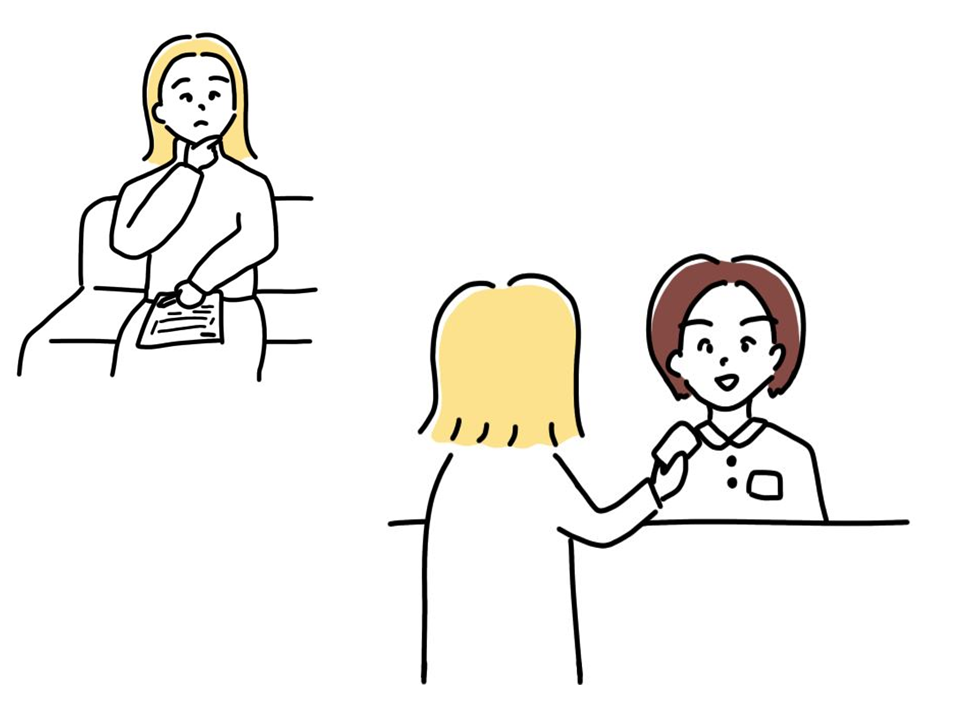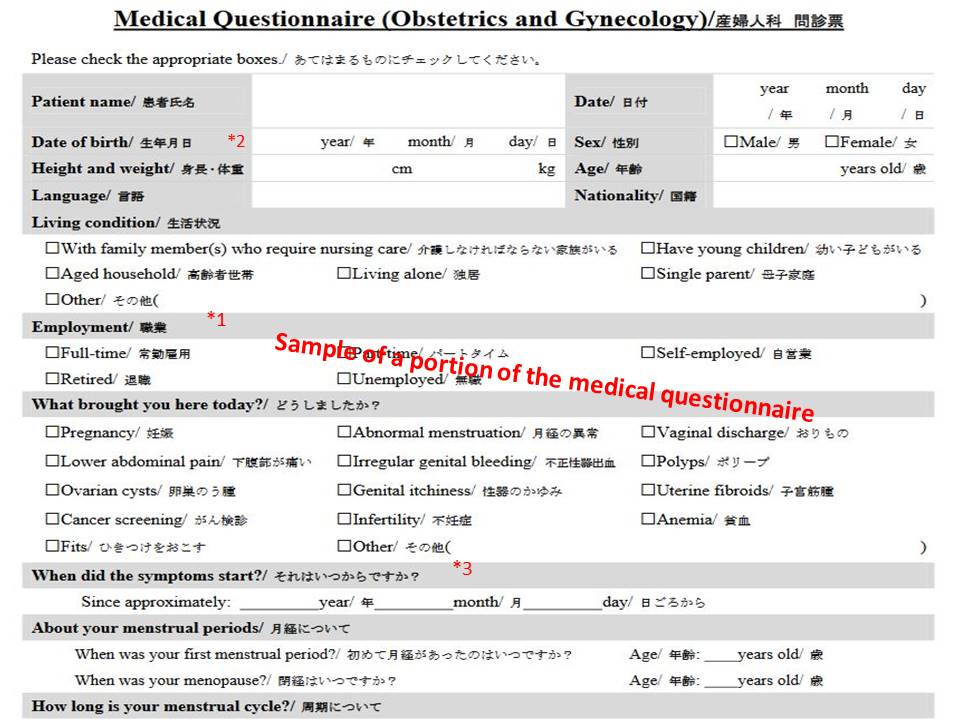
02 Feb Chapter 3: Visiting an OB/GYN さあ、産婦人科へ行こう!
The original content is here ⇒日本語
The Patient Questionnaire serves as a means of communication between you and your doctor.
You may find that OB-GYN patient questionnaires contain several personal questions. However, they are all important.
It’s best if you answer them all, if possible, but if you would rather not, it’s all right to skip some.
One Student’s Experience
I always felt bad before my period, and sometimes I couldn’t get out of bed and had to miss school. I couldn’t eat for a few days and even threw up when it was really bad. When I was a high school student, my impression of OB-GYN equaled a place for pregnancy and birth, so I was worried about how others would see me and that stopped me from going. I had my first OB-GYN visit when I was a university student and was diagnosed with PMS (premenstrual syndrome).
(→Refer to chapter 2.)
I found out that all the symptoms I had were treatable.
An OB-GYN is a place where you can consult a medical professional.
Below is a part of the English medical questionnaire from the Japanese Ministry of Health, Labor and Welfare.
There is a reason for what is asked in the questionnaire. The full text of the questionnaire can be found by clicking here.
Below are some questions which may be asked and the reasons why they are being asked.
-
-
- Employment*1
This will help your doctor to understand your daily life for reference to a treatment plan. - Date of Birth*2
Different ages are susceptible to different diseases! - When did the symptoms start?*3
This will enable an accurate identification of the cause and response to the problem. - When was the first day of your last period?
Keeping track of your last period helps when you see a doctor. - Have you ever had sexual intercourse?
This question is important to determine whether a pelvic examination can be performed and whether there is the possibility of sexually transmitted infections. - Is there a possibility that you are pregnant?
It is important to consider if you are pregnant or not. - Are you currently taking any medications?
Do you smoke?
Do you drink alcohol?
Are you allergic to any foods or medications?
These are important for deciding on available medications and treatment.*Questionnaires vary depending on the healthcare facility.
Ask your OB-GYN doctor

May I ask “Please keep the cost under 〇〇yen.” ?
This would depend on the medical institution.
If you are on a limited budget, you should talk to the doctor at the beginning of the consultation. Most exams are covered by health insurance so you should not have to pay very much, but there is a possibility that you will have to pay a portion of your own expenses. Fees for tests and medications are sometimes
 stated on the medical institutions’ websites or posted inside the hospital, so it is a good idea to refer to them. If you have private insurance, ask your insurance company since some procedures may be eligible for benefits. (This would depend on your contract.)
stated on the medical institutions’ websites or posted inside the hospital, so it is a good idea to refer to them. If you have private insurance, ask your insurance company since some procedures may be eligible for benefits. (This would depend on your contract.) I am a minor. Will you tell my parents or school about my OB-GYN visit?
I am a minor. Will you tell my parents or school about my OB-GYN visit?Because of doctor-patient privilege, disclosing information without consent is not permitted.
It is possible for a minor to visit a doctor alone, but some hospitals require the minor to be accompanied by a parent or guardian or have age restrictions. The reason is that it may be necessary to inform the guardian about medical fees.
Under the School Education Act, there is no obligation to report visits to the OB-GYN to schools, and this is not usually done. In cases where it is considered necessary to inform the school, such as in cases of physical disability, we will do so after confirming with the patient and his/her parents or guardians.

When a dependent’s health insurance card is used, a medical report may be sent, but one will not be sent for any treatment not covered by health insurance.
 If I have a bad experience at the first OB-GYN visit, is it all right to change hospitals without permission?
If I have a bad experience at the first OB-GYN visit, is it all right to change hospitals without permission?Changing hospitals is your right and you are free to do so.
If treatment has been provided at one
 hospital, medical information such as the kind of treatment and medication may be needed at a second hospital. Therefore, the second one may obtain information from the first one, with your consent.
hospital, medical information such as the kind of treatment and medication may be needed at a second hospital. Therefore, the second one may obtain information from the first one, with your consent.
May I decline a pelvic examination?
Of course, you can refuse a pelvic exam if you don’t want it!
We do not perform a pelvic examination if the patient is young, has never had sexual intercourse, or does not want to have one.
Pelvic examinations are very useful, providing information inside the pelvic cavity. You can make a decision after hearing
 a full explanation about why it is necessary.
a full explanation about why it is necessary.If a pelvic examination is not performed, we run a transabdominal or transrectal ultrasound, or MRI, if necessary.
- Employment*1
-


